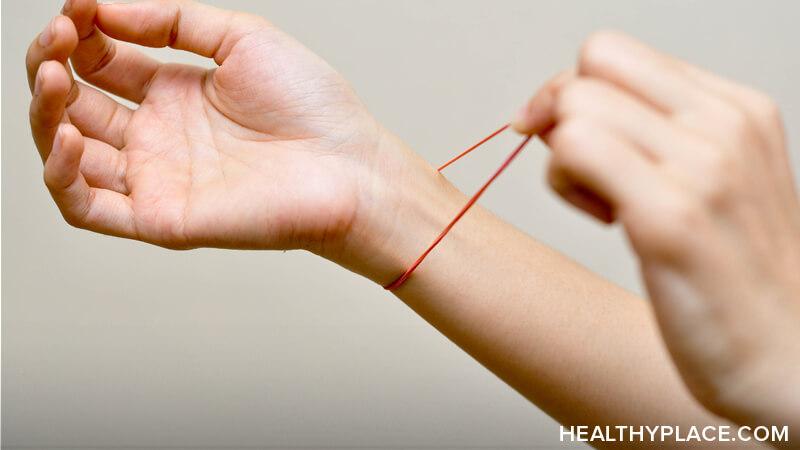What Counts as Self-Harm?

Not every case of self-injury is obvious. Whether you're talking clinically or colloquially, it can be hard sometimes to clearly define what counts as self-harm and what does not.
What Counts as Self-Harm, Clinically Speaking
According to the Diagnostic and Statistical Manual of Mental Disorders, Fifth Edition (DSM-5), nonsuicidal self-injury is defined as,
"the deliberate, self-inflicted destruction of body tissue without suicidal intent and for purposes not socially sanctioned."1
In other words, self-harm is not the same as a suicide attempt. It describes an act of physical harm you purposely inflict on yourself. Death is not the goal, although fatal accidents may certainly arise from extreme acts of self-harm. If anything, self-harm is an act of self-preservation—injury becomes a coping method to deal with difficulties that we may feel unable to handle in other ways.
But there is a gray area here in which the question of what counts as self-harm remains wide open. What about someone with obsessive-compulsive disorder (OCD) who washes their hands so many times their skin is rubbed raw? What if you hurt yourself in your sleep while dreaming about self-harm? What about skin-picking?
Determining What Counts as Self-Harm
Unfortunately, I am not a therapist or any kind of licensed mental health professional. My knowledge of self-harm is based on personal experience, not professional training. So, I can't offer you an official diagnosis, even if you were to share your entire life story and family history with me.
But what I can tell you is this: if you are hurting yourself on purpose, for any reason, it's a good idea to reach out for help. If you can't help hurting yourself, even if you don't consciously mean to, it's still a good idea to reach out for help. And if you find it difficult to stop hurting yourself—reach out for help.
Professional medical support is usually ideal, as doctors have specialized training and years of experience that you can benefit from. A mental health professional, in particular, can be instrumental in determining what counts as self-harm and what does not. They will also be able to help you cope with whatever you're going through, regardless of your specific diagnosis.
But there are other people you can reach out to as well. Support groups can connect you with others struggling with similar challenges, along with individuals farther along the recovery path who have found good ways to overcome those challenges. Even just talking through your worries and problems with a trusted friend or family member can lift a huge weight off of your shoulders—or at least help you find better ways to bear it.
Regardless of whether what you're currently struggling with counts as self-harm or not, if you are struggling, please never forget—you don't have to go through it alone.
Source
-
Zetterqvist, M. (2015). The DSM-5 diagnosis of nonsuicidal self-injury disorder: a review of the empirical literature. Child and Adolescent Psychiatry and Mental Health, 9(1). https://doi.org/10.1186/s13034-015-0062-7
APA Reference
Kim Berkley
(2022, June 2). What Counts as Self-Harm?, HealthyPlace. Retrieved
on 2026, March 1 from https://www.healthyplace.com/blogs/speakingoutaboutselfinjury/2022/6/what-counts-as-self-harm
Author: Kim Berkley
Is biting yourself till the point of where you get severely bruised, considered self-harm, or no?
I love to self harm it helps me get rid of the world and get into my own life. I don't need help I need to be alone and I need to feel free. I am 14 years old and I'm in foster care all of my siblings are separated from me and each other. My life just keeps on getting harder every day.
can it be if you open your arm with a pair of compasses that that is self-harm and pulling your hair out of your head?
Can bitting arms or the side of your mouth for blood consider self harm? Can piling a rubber band And having it slap u be self harm? Or having a sharp pen like a calligraphy pen scratch u be self harm?
Hi Brey,
I am not a licensed mental health professional, so I can't provide an official diagnosis here. However, my unprofessional opinion is that at least some of these things could definitely "count". The most important thing is, are these things impacting the quality of your life? If you're hurting yourself to feel better, or to feel anything at all, and especially if you're feeling guilty or worried about being found out, these are just a few signs that you might be heading down a difficult path.
In short--if you're feeling like something might be wrong, it's worth talking to someone about it if you can. Reaching out here was a great first step. Finding someone you can talk to personally (a trusted friend or family member) or professionally (a therapist or school counselor, for example) would be an even better step to take next.
Take care,
Kim
Thank you for this informative text. As someone who’s dealing/been dealing with self-harm I find this really helpful for some people to understand what it’s really about.
Hi Leila,
Thank you for your comment. I'm so glad you found this article helpful. I hope things get better for you. Take care!
Sincerely,
Kim